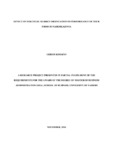| dc.description.abstract | Firms seeking to remain competitive and achieve superior firm performance have to anticipate
what their customers want and at the same time determine if they are satisfied with the firm’s
products and services. Given the complexities of the market place, increased competition,
globalization, changing customer needs and wants, firms require a strong market orientation and
innovative marketing practices to remain competitive. They should therefore manage their target
markets more efficiently and effectively than their competitors. This requires them to be market
oriented. This means that business entities adjust their operations continuously so as to capture
the opportunities that arise as well as vend of any business challenges that will affect the
business strategies. Therefore, the capacity of a firm to re-orientation has a strong and positive
impact on performance. The objective of the study was to determine the effect of strategic
market orientation on performance of tour firms in Nairobi, Kenya. The research design used
was descriptive cross sectional survey design. The population of the study consisted of all the
267 tour firms operating in Nairobi. The study adopted stratified sampling and simple random
sampling techniques in selection of respondents for the study. The study used primary data that
was collected through self-administered questionnaires containing both open ended and closed
questions. The data was analyzed by the use of descriptive statistics. The regression analysis was
used to assess the effect of strategic market orientation on performance of tour firms in Nairobi,
Kenya. The study found out that customer orientation enabled the tour firms to have strong
commitment to their customers, be better off if the market department worked a bit harder,
evaluate the customer needs and ensure customer satisfaction in order t create value for
customers. The tour firms were found to be using competitor orientation to collect data on their
competitors in order to enable the firms to come up with strategies that would counter
competitors’ actions in order to achieve competitive advantage over competitors. Inter-functional
coordination was being used by tour firms throughout the departments in order to increase
customer value and build business plans to meet the needs of prospective and current customers.
The performance of the tour firm is affected by strategic marketing orientation as they play a key
role in the firms’ profits, employee and customer satisfaction, market share and financial
viability. The regression analysis showed that customer orientation, competitor orientation and
inter-functional coordination jointly influence performance of tour firms in Nairobi. The study
recommends that the management of the tour firms has to ensure that the strategic market
orientation was being taken seriously as they play a critical role in determining firm
performance. The study further recommends that there is need for strategic and operational
government interventions as the country endeavours to be a globally competitive and prosperous
nation. | en_US |



